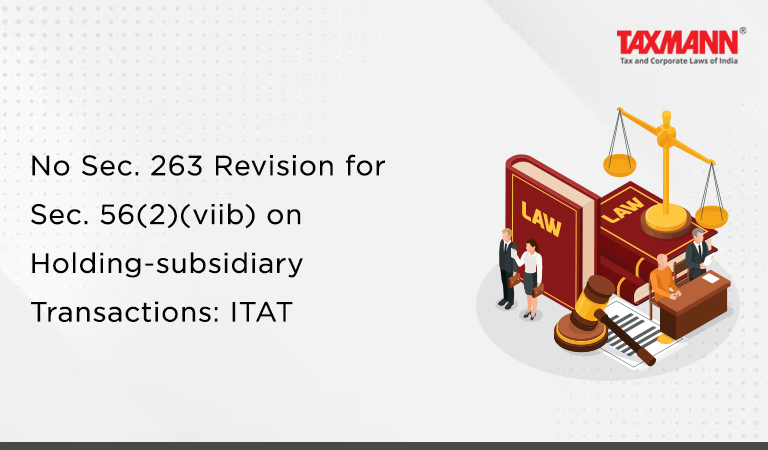No Sec. 263 Revision for Sec. 56(2)(viib) on Holding-subsidiary Transactions: ITAT
- Blog|News|Income Tax|
- 2 Min Read
- By Taxmann
- |
- Last Updated on 6 June, 2023

Case Details: BLP Vayu (Project-1) Pvt. Ltd. v. PCIT - [2023] 151 taxmann.com 47 (Delhi-Trib.)[31-05-2023]
Judiciary and Counsel Details
-
- Challa Nagendra Prasad, Judicial Member & Pradip Kumar Kedia, Accountant Member
- Rajiv Jain, CA for the Appellant.
- Kanv Bali, Sr. DR. for the Respondent.
Facts of the Case
Assessee-company is engaged in the business of generating and dealing in electricity. During the year under consideration, the assessee issued shares to its holding company and received a huge share premium. Assessee’s case was selected for scrutiny assessment. After examining the Fair Market Value (FMV) of the shares and the genuineness of the transaction, the income of the assessee returned was accepted by the Assessing Officer (AO) without any modifications.
Subsequently, exercising the revisional powers as per section 263, the Principal CIT (PCIT) issued a show cause notice contending that the assessment was prejudicial to the interest of revenue as AO failed to examine the genuineness of the transaction, creditworthiness of the persons from whom share premium was received been received has rendered.
Aggrieved-assessee preferred an appeal to the Delhi Tribunal.
ITAT Held
The Tribunal held that it was an undisputed fact that the shares had been allotted at a premium to its 100% holding company. The objective behind the provisions of Section 56(2)(viib) is to prevent unlawful gains by issuing company in the garb of capital receipts.
In the instant case, not only is the FMV supported by independent valuer report, but the allotment has been made to the existing shareholder holding 100% equity. Thus, there is no change in the interest or control over the money by such issuance of shares. The object of deeming an unjustified premium charged on the issue of shares as taxable income under Section 56(2)(viib) is wholly inapplicable for transactions between the holding and its subsidiary company where no income can be said to accrue to the ultimate beneficiary, i.e., holding company.
Therefore, there is no benefit derived by the assessee by issue of shares at certain premium, notwithstanding that the share premium exceeds a fair market value in a given case. Instinctively, it is a transaction between the self.
The chargeability of deemed income arising from transactions between holding and subsidiary or vice versa militates against the solemn object of Section 56(2)(viib). In this backdrop, the extent of inquiry on the purported credibility of the premium charged does not really matter as no prejudice can possibly result from the outcome of such inquiry.
Thus, the condition for the applicability of Section 263 for inquiry into the transactions between interwoven holding and the subsidiary company was of no consequence.
Disclaimer: The content/information published on the website is only for general information of the user and shall not be construed as legal advice. While the Taxmann has exercised reasonable efforts to ensure the veracity of information/content published, Taxmann shall be under no liability in any manner whatsoever for incorrect information, if any.

Taxmann Publications has a dedicated in-house Research & Editorial Team. This team consists of a team of Chartered Accountants, Company Secretaries, and Lawyers. This team works under the guidance and supervision of editor-in-chief Mr Rakesh Bhargava.
The Research and Editorial Team is responsible for developing reliable and accurate content for the readers. The team follows the six-sigma approach to achieve the benchmark of zero error in its publications and research platforms. The team ensures that the following publication guidelines are thoroughly followed while developing the content:
- The statutory material is obtained only from the authorized and reliable sources
- All the latest developments in the judicial and legislative fields are covered
- Prepare the analytical write-ups on current, controversial, and important issues to help the readers to understand the concept and its implications
- Every content published by Taxmann is complete, accurate and lucid
- All evidence-based statements are supported with proper reference to Section, Circular No., Notification No. or citations
- The golden rules of grammar, style and consistency are thoroughly followed
- Font and size that’s easy to read and remain consistent across all imprint and digital publications are applied



 CA | CS | CMA
CA | CS | CMA
